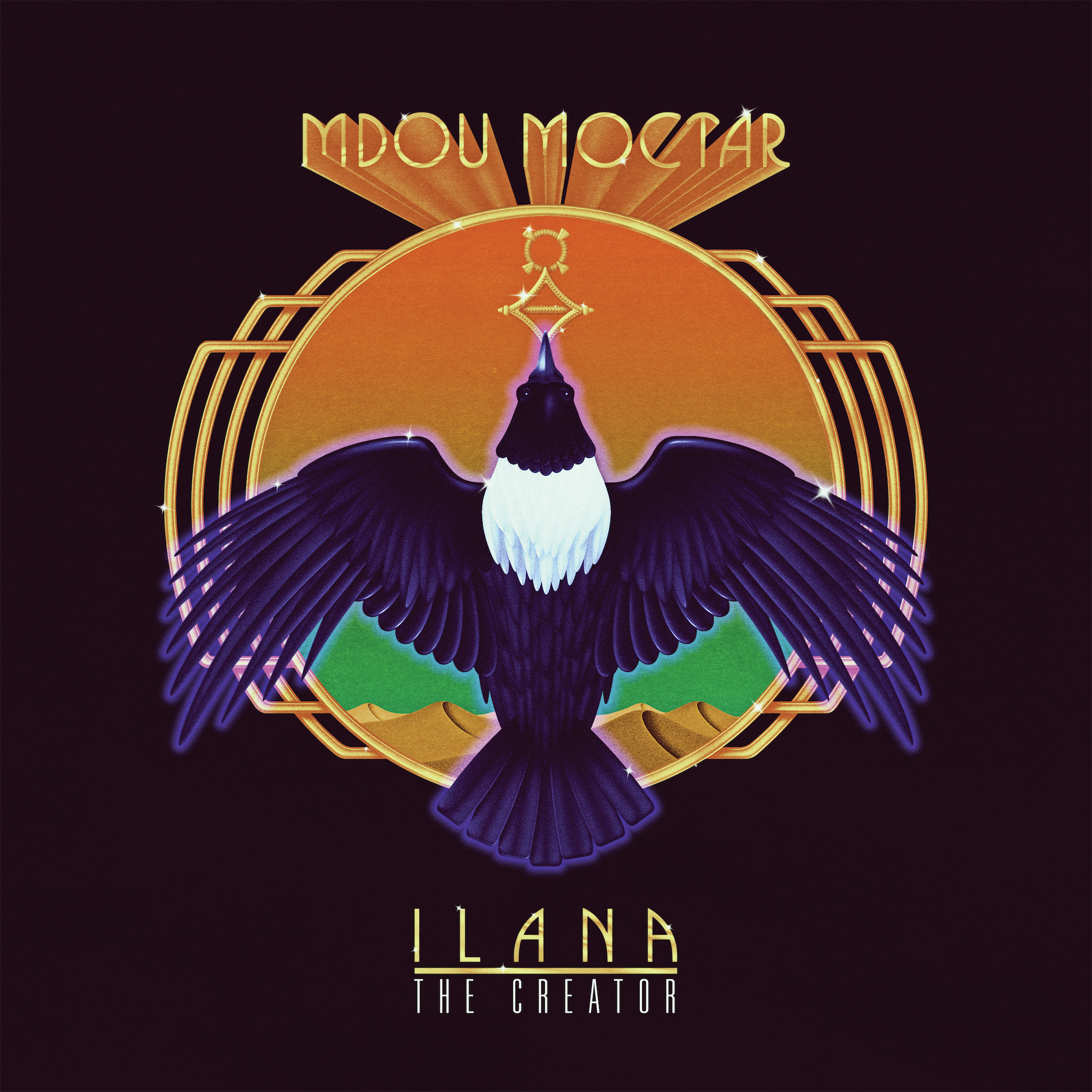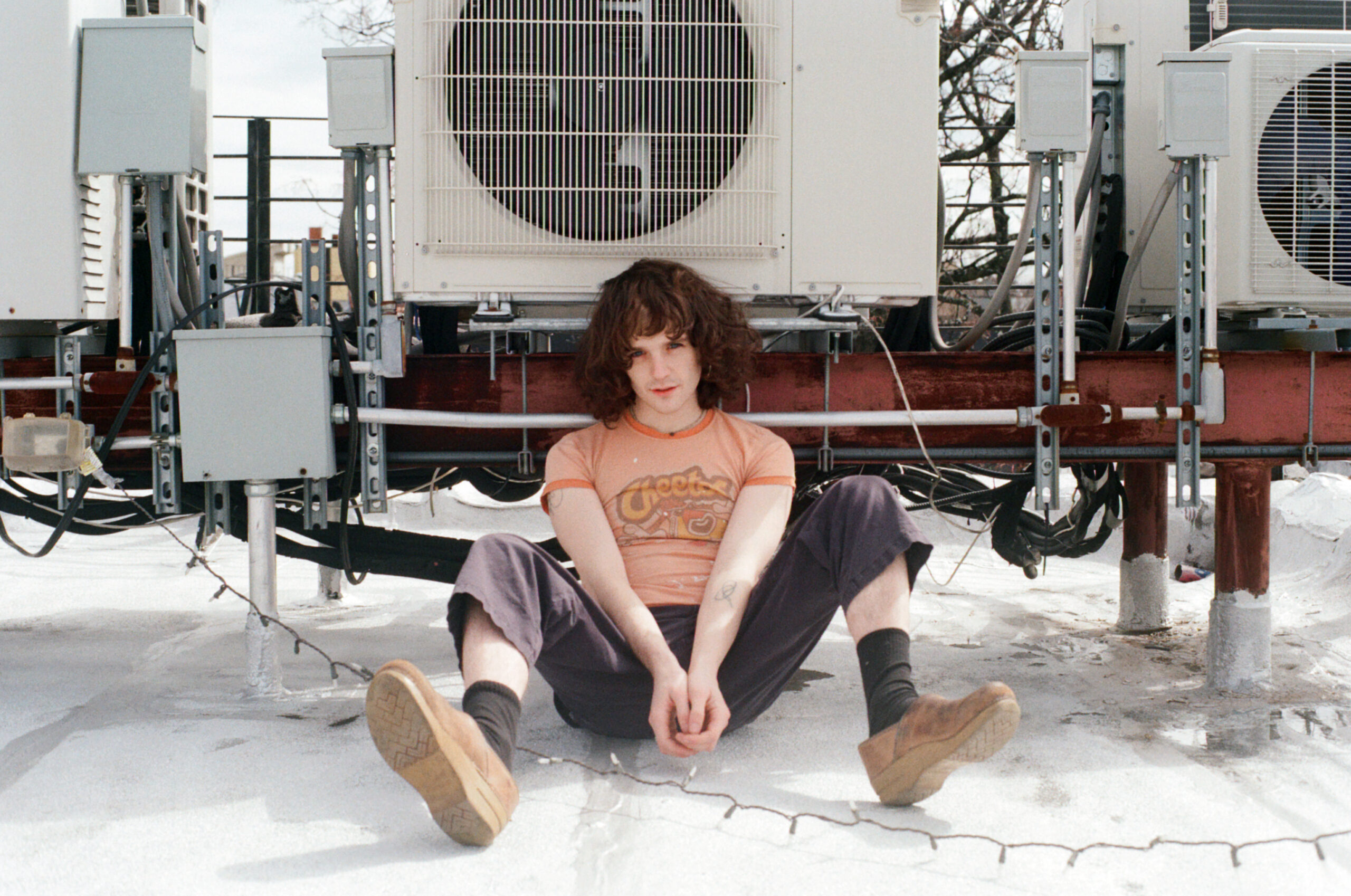Ever since the Malian "desert blues" band Tinariwen began to build an international audience at the dawn of the millennium, a steady stream of Saharan guitar music has been making its way around the world. The list of renowned Tuareg rock acts has grown to include the likes of Algeria's Imarhan, Niger's Kel Assouf, and others, each with their own unique blend of Western music and traditional Tuareg sounds. Historically, the Tuaregs are semi-nomadic people, and perhaps no one has wandered farther with such hybrids than Mdou Moctar.
Moctar, 34, grew up in Niger, first in the rural village of Tchintabaraden and then in the uranium mining town Arlit. He developed a love for the guitar early on but had to be inventive to play one -- literally, he built his own. "It was made by hand, using wood, and cables from bicycle brakes," Moctar writes via email. "It only had five strings because it wasn't wide enough for six." That ingenuity carried over into his musical career. A couple decades later, Moctar has amassed one of the most intriguing discographies in all of Tuareg rock.
His 2008 debut, Anar, incorporated Auto-Tune and other electronic elements and become a hit in the viral cellphone-trading networks that function as the Saharan version of file sharing; its opening track "Tahoultine" ended up on the widely praised Music From Saharan Cellphones comp in late 2011. Next up was 2013's Afelan, a live album recorded in Tchintabaraden that saw him flexing his abilities in both traditional Tuareg sounds and Western guitar-hero shredding.
Moctar's career took a surprising turn when he and Chris Kirkley, whose Portland-based Sahel Sounds signed Moctar after releasing Music From Saharan Cellphones, decided Moctar should star in a remake of Purple Rain after noticing some similarities between Prince's life story and his own. The resulting film -- the first feature film ever made in the Tuareg language -- was titled Akounak Tedalat Taha Tazoughai, which translates to Rain The Color Of Blue With A Little Red In It. (There is no Tuareg word for "purple.") He followed that movie's 2015 soundtrack -- which, alas, does not feature Prince covers -- with a solo acoustic desert blues album called Sousoume Tamachek in 2017.
Now Moctar is ready to release Ilana: The Creator, his first full-band studio album. He and his bandmates recorded in Detroit with Akorn/Family's Chris Koltay, who has worked as a recording engineer for the Dirtbombs, Xiu Xiu, and Black Milk and done live sound for the likes of Deerhunter, the War On Drugs, and No Age. Moctar hired Koltay after they bonded over their mutual love of ZZ Top. "He knows my taste in my music," Moctar writes. "I really liked when when he mixed sound for me in Detroit at Third Man. The sound was exactly what I look for in music."
The resulting record rips as hard as you'd hope, but often with a playful brightness that has been lost in much of the Western rock scene. On songs like "Tarhatazed," "Kamane Tarhanin," and the title track, Moctar's spiraling riffs untangle like tentacles across fervent hypnotic rhythms. "Inizgam" leans hard into electric blues, like what Hendrix or Led Zeppelin might sound like if they'd grown up in Niger. Album closer "Tumastin," premiering today, reins in Moctar's usual virtuosity to send Ilana off with warm vibes and an easygoing float.
Yet despite the joyous energy and positive-minded lyrics about Islam and respecting tradition, Ilana is not necessarily a happy record. Moctar says it's largely inspired by the plight of the Tuareg people, particularly the women. "Ilana," in particular, addresses French exploitation of uranium in Niger: "Our benefits are only dust / And our heritage is taken by the people of France / Occupying the valley of our ancestor."
Below, read more excerpts from an email exchange with Moctar and hear today's new single "Tumastin."
STEREOGUM: How does your music fit into the current Tuareg scene? In your opinion, what is unique or special about your approach?
MDOU MOCTAR: The Tuareg population is very proud of what I'm doing with music, because I've become an ambassador of the Tuareg world, on the musical side. I'm continuing to share with the world the descriptions of their situations. I'm someone who collaborates with traditional music, I really like this style and I always guard it. If you listen to my music, even if it's with guitar, you can hear this traditional style inside.
STEREOGUM:The new album is named after your song "Ilana." Why did you choose that song to be the title track?
MOCTAR: I like the message of "Ilana." The name Ilana means the creator, or god. It's a song that talks about the suffering of women in the desert. For this reason I picked it to be the title of my album.
STEREOGUM:What were some of the subjects on your mind when you were writing this album?
MOCTAR: I have a lot of thoughts for the women who live in the desert. This is what pushed me to make this album. I want the world to understand that the women of the desert need help. They're not in any type of luxury. They don't have water to drink, there's no medicine in the hospitals.
STEREOGUM: I read that you grew up in the village of Tchintabaraden and then another place called Arlit. What were those places like?
MOCTAR: Tchintabaradne, means the "city of the beautiful girls." It's a village 300 kilometers from Agadez. It's the village where I grew up with my family. Later, I studied in Arlit. Arlit is a city where there are lots of uranium mining. It was there that I started playing guitar.
STEREOGUM: Where do you live now?
MOCTAR: I'm in Tchintabaradene. But I have a house in Agadez. I stay a lot in Tchintabaradene because my mother lives here.
STEREOGUM: What was some of the music that made you want to start playing guitar when you were growing up?
MOCTAR: It was music from an artist named Abdallah Oumbadougou. I really love his song "Ifitalane."
STEREOGUM: How did you meet your current bandmates? Why did you ask them to be in your band?
MOCTAR: I met Ahmoudou Madassane (rhythm guitar) in Agadez. He was a fan of my music. Souleymane Ibrahim (drummer) is someone I knew from Agadez from playing in weddings. I met Mikey Coltun in the USA, he was also a fan of my music, and I really like his bass guitar, he plays in the style of Tuareg and has traveled a lot in West Africa.
STEREOGUM: I read that you saved someone from a car accident during your recent US tour. What happened there?
MOCTAR: We were driving in Nashville and saw a woman in a car that had crashed with a big truck. We decided to stop and to help her get out, and make sure she was OK. I had to force the car door open with my hands. We waited with her and make sure she was calm until the police came. She was fine.
STEREOGUM: You've done an electronic album, a live album, a desert folk album, and a loud electric guitar album. What's next?
MOCTAR: I'm really curious to try other styles with Tuareg music. I want to mix music modern with the guitar that it's traditional in my style. With my electronic music, and autotune, and electronic voice, it was just an experiment. Maybe I can do something like what Michael Jackson has done with pop music, see what it can give to my music. Let's see!

Ilana: The Creator is out 3/29 on Sahel Sounds. Pre-order it here.






